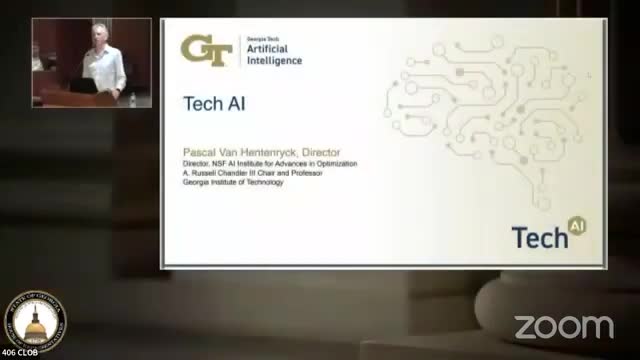Georgia Tech leads the charge in AI innovation
August 16, 2024 | HOUSE OF REPRESENTATIVES, Committees, Legislative, Georgia
This article was created by AI summarizing key points discussed. AI makes mistakes, so for full details and context, please refer to the video of the full meeting. Please report any errors so we can fix them. Report an error »

Georgia Tech is positioning itself as a leader in artificial intelligence (AI) research and education, with a focus on creating a trustworthy AI framework that benefits society. During a recent government meeting, representatives highlighted the university's significant contributions to AI, noting that it employs around 1,000 individuals in the field, including 500 faculty and research staff, alongside a robust student body pursuing advanced degrees.
Georgia Tech has been recognized as the fifth-best AI program in the United States and is striving to break into the top four. The institution produces approximately 3.2% of the nation's AI talent annually, making it a critical player in the development of skilled professionals in this rapidly evolving sector. The state of Georgia is home to three National Science Foundation (NSF) AI institutes, the highest number in any state, underscoring the region's commitment to advancing AI research.
The meeting also addressed Georgia Tech's interdisciplinary approach to AI, which encompasses various applications, including engineering, healthcare, and education. Notable projects include initiatives in precision agriculture, robotics, and urban farming, which leverage AI technologies to enhance efficiency and productivity. The university is also actively involved in training the next generation of AI professionals through high school outreach programs and collaborations with institutions like Clark Atlanta University.
In response to inquiries about job placements for PhD graduates, it was revealed that many are recruited by major tech companies such as Google and Microsoft, as well as in emerging sectors like healthcare and supply chain management. However, the competitive job market poses challenges for Georgia Tech, as the salaries offered by high-tech firms often far exceed those available in academia, complicating recruitment efforts for AI researchers.
Overall, Georgia Tech's initiatives reflect a commitment to harnessing AI's transformative potential while addressing the ethical implications and workforce needs associated with this technology.
Georgia Tech has been recognized as the fifth-best AI program in the United States and is striving to break into the top four. The institution produces approximately 3.2% of the nation's AI talent annually, making it a critical player in the development of skilled professionals in this rapidly evolving sector. The state of Georgia is home to three National Science Foundation (NSF) AI institutes, the highest number in any state, underscoring the region's commitment to advancing AI research.
The meeting also addressed Georgia Tech's interdisciplinary approach to AI, which encompasses various applications, including engineering, healthcare, and education. Notable projects include initiatives in precision agriculture, robotics, and urban farming, which leverage AI technologies to enhance efficiency and productivity. The university is also actively involved in training the next generation of AI professionals through high school outreach programs and collaborations with institutions like Clark Atlanta University.
In response to inquiries about job placements for PhD graduates, it was revealed that many are recruited by major tech companies such as Google and Microsoft, as well as in emerging sectors like healthcare and supply chain management. However, the competitive job market poses challenges for Georgia Tech, as the salaries offered by high-tech firms often far exceed those available in academia, complicating recruitment efforts for AI researchers.
Overall, Georgia Tech's initiatives reflect a commitment to harnessing AI's transformative potential while addressing the ethical implications and workforce needs associated with this technology.
View the Full Meeting & All Its Details
This article offers just a summary. Unlock complete video, transcripts, and insights as a Founder Member.
✓
Watch full, unedited meeting videos
✓
Search every word spoken in unlimited transcripts
✓
AI summaries & real-time alerts (all government levels)
✓
Permanent access to expanding government content
30-day money-back guarantee

